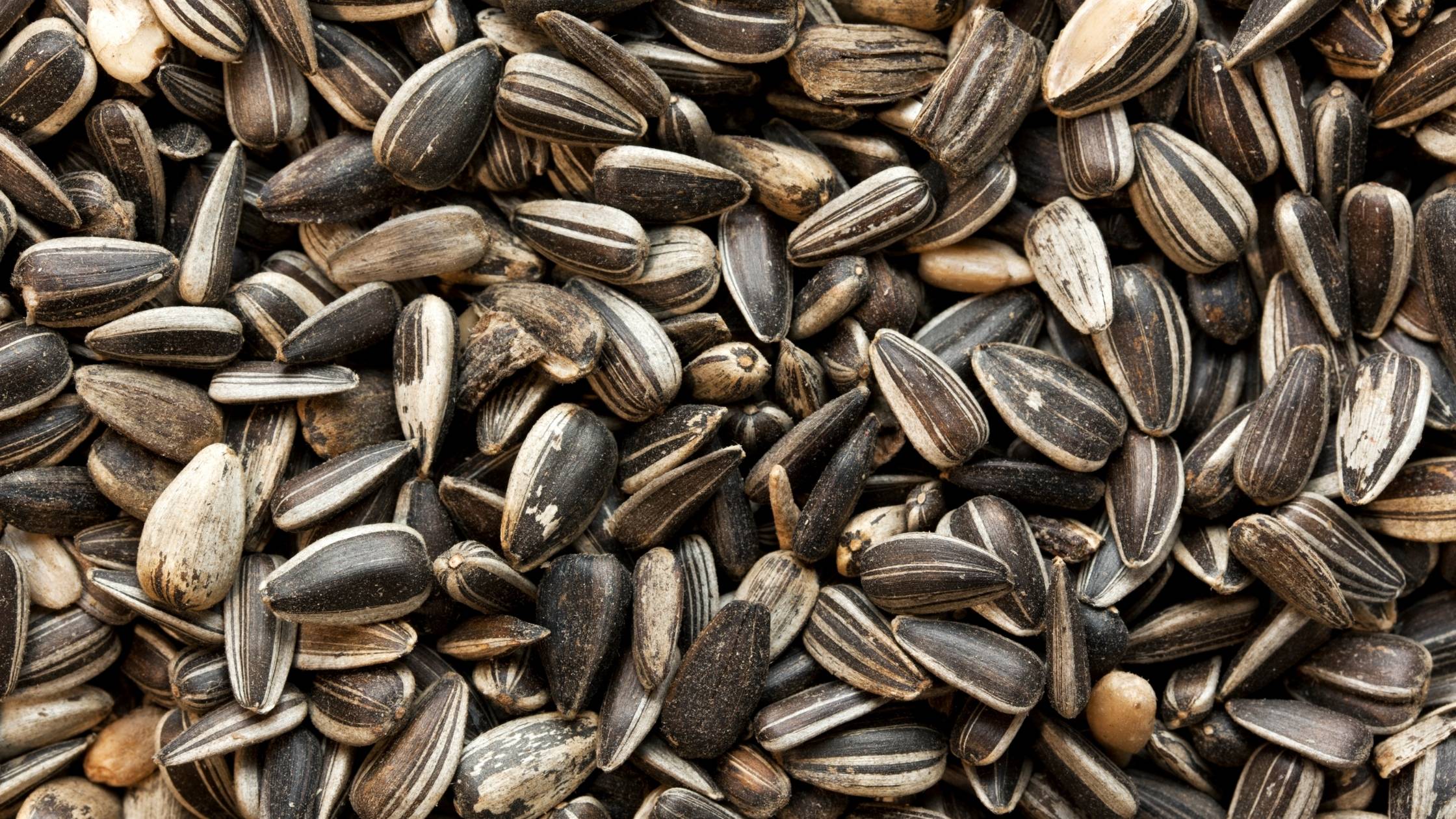As dog owners, you will already understand the constant battle of trying to keep human or other animal food away from your four-legged friend. It is never an easy task and this is why it is crucial to know what is good for them and what’s not. So, can dogs eat sunflower seeds? Here, we explore the benefits and side effects…
Can dogs eat sunflower seeds?
Yes, but not the shells as a dog’s digestive system will struggle to break them down, which could lead to severe diarrhea and even gastrointestinal distress. Most dogs love the taste of sunflower seeds and can be given as an occasional nutritional snack if peeled, contain no flavorings and are given in moderation.
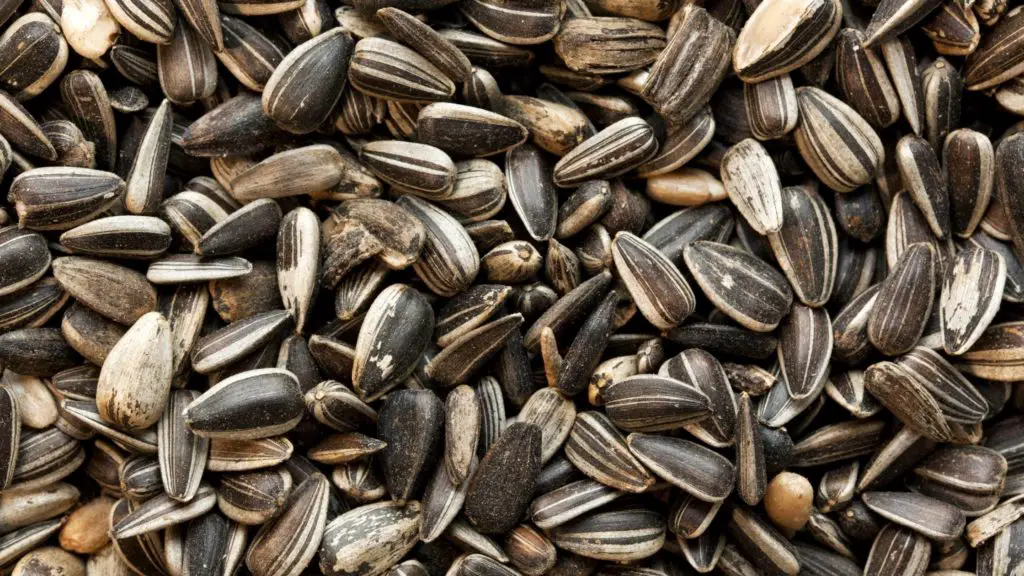
What are sunflower seeds?
Sunflower seeds come from the flower head of the sunflower. A single head of a sunflower could contain up to 2,000 seeds. The seed is encased in a hard black and white striped shell. The actual seed itself is white in color and contains lots of nutrients and is enjoyed by humans as a healthy snack to support their immune system. For pets such as cats and dogs, sunflower seeds are also considered a safe snack for them due to the multitude of minerals and vitamins they contain but it is recommended that these seeds are fed to them in moderation to enjoy sparingly.
Are sunflower seeds bad for dogs?
If your dog eats sunflower seeds it is unlikely that they will experience any long-term health issues. However, it’s important to prepare the seeds correctly before serving them to your pooch. Peeling them is a must as pointed out above.
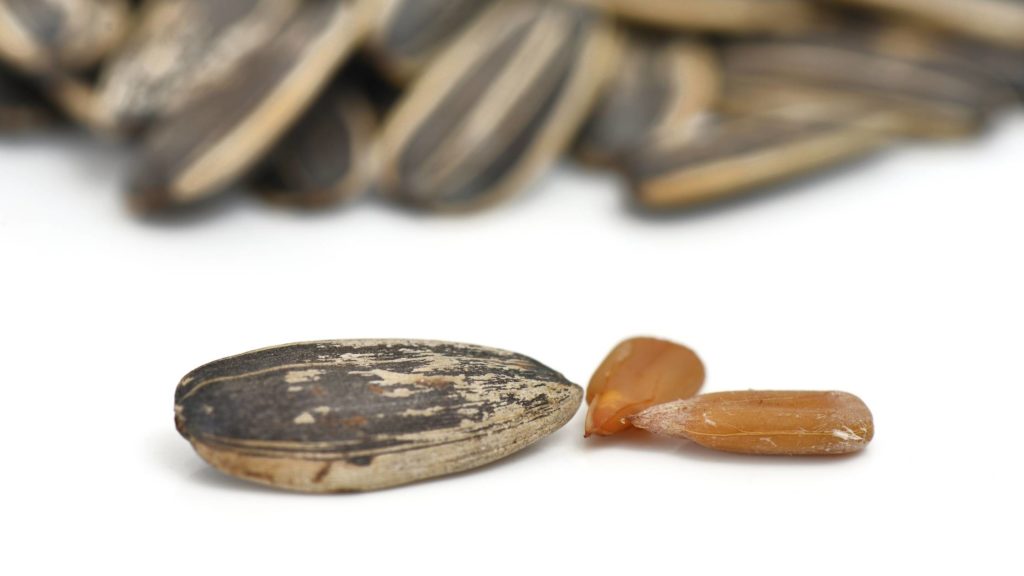
Can sunflower seeds make dogs sick?
As with all human foods, there are some risks associated with giving your pooch sunflower seeds. The sunflower seed itself is high in fat meaning it can be difficult for your dog’s digestive system to break it down. Too many sunflower seeds are the most common cause of sickness and diarrhea in dogs who have eaten a large number.
Potential side effects of sunflower seeds for dogs
Salted sunflower seeds can be toxic for canines: avoid sunflower seeds that contain added salt as too much salt can lead to poisoning in dogs. Salt poisoning can have symptoms such as vomiting, diarrhea, lack of appetite, lethargy, drinking and urinating more frequently. In more severe cases, excessive salt in your dog’s system can cause seizures, tremors, a coma and even death. If you think your dog has consumed excessive amounts of salt, ensure they drink plenty of water to dilute the salt and contact your veterinarian straight away.
Sunflower seeds can lead to gastrointestinal distress: lingering cases of bloating, constipation, vomiting and diarrhea in dogs can cause inflammation of the stomach which is often caused by items that dogs can’t chew and digest properly such as sunflower seed shells. Dogs with gastroenteritis are often withheld food for 24-48 hours while treatments such as antibiotics and anti-vomiting drugs are given to help settle your dog’s stomach. In rare cases, an unshelled sunflower seed could get stuck in a dog’s gastrointestinal tract and cause a blockage, which can be life threatening.
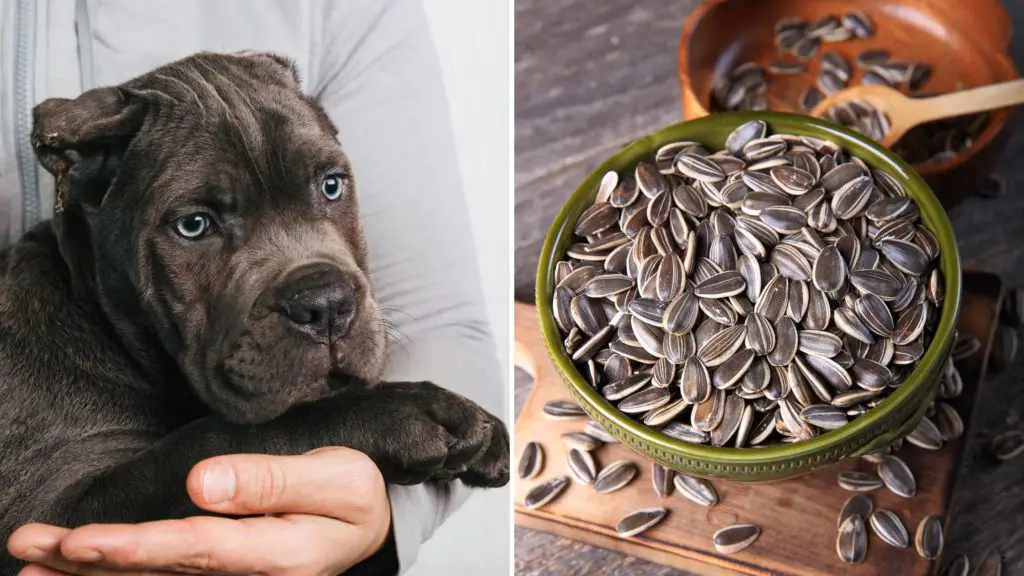
Some dogs may be allergic to sunflower seeds: your pet could be allergic to parts of sunflower seeds which can lead to side effects such as lethargy and vomiting if eaten. If you haven’t fed your dog sunflower seeds before it’s a good idea to give him no more than five to check that he doesn’t react to them. If you think your canine friend is suffering from an allergic reaction to sunflower seeds, get in touch with your veterinarian.
If your dog is allergic to sunflower seeds, choose other types of food that contain Vitamin E and fatty acids such as fish, red meat, eggs and coconut oil.
Excessive amounts of oil in sunflower seeds could make your dog sick: if your dog has a sensitive stomach, they may experience sickness and diarrhea from consuming sunflower seeds and should be avoided. Also, if your dog suffers from pancreatitis (an inflammation of the pancreas), the extra fat contained in sunflower seeds could cause a flare-up.
Weight gain: sunflower seeds are high in calories, which could lead to excess weight gain if fed too often to your pooch. Overweight dogs are at an increased risk of different types of cancer, heart disease, degeneration of joints and bladder stones. It’s important that you measure the amount of sunflower seeds that you serve your dog and take the calories into account as part of his daily intake. 46 grams of sunflower seeds contains approximately 269 calories.
Benefits of sunflower seeds for dogs
So, we know that the anser to ‘can dogs eat sunflower seeds’ is a clear ‘yes’ – but are there any benefits to them doing so? Sunflower seeds are packed full of vitamins and minerals including:
- Vitamin E – good for your dog’s immune system, liver, heart health and a healthy coat.
- Copper – needed for the activity of red blood cells and for normal hair and skin color.
- Vitamin B1 (thiamine) – essential for proper functions of high energy organs.
- Manganese – helps your pooch to produce energy.
- Selenium – aids your dog’s immune functions and thyroid hormone metabolism.
- Phosphorus – good for your dog’s bones and teeth and is similar to calcium.
- Magnesium – crucial for your dog’s energy production and can help with moods.
- Vitamin B6 – vital for the production of red blood cells and immune response.
- Folate – needed for forming red blood cells and healthy cell growth.
- Vitamin B3 – aids proper circulation and gives your pooch healthy skin.
Here are five ways that sunflower seeds can improve your dog’s health, if given correctly and in moderation:
1. Maintains blood pressure
Sunflower seeds contain healthy fatty acids that promotes good cholesterol, meaning your dog is less likely to suffer a stroke or develop heart disease. High blood pressure can affect canines’ kidneys, heart, eyes and nervous system so it’s important to keep it at a healthy level. Between 0.5% and 10% of dogs have high blood pressure.
2. Boosts antioxidant levels
Sunflower seeds contain a high amount of Vitamin E which is an essential part of a dog’s diet. It improves and supports their immune system, cardiovascular health, prevents cataracts and even promotes fertility.
3. Improves coat and skin
The fatty acids in sunflower seeds have also been proven to maintain healthy skin and coat in canines.
Regularly grooming your dog’s fur to remove loose hairs and dead skin cells will also help keep its coat in top condition.
4. Reduce stress and depression
Sunflower seeds contain magnesium which has been proven to reduce fatigue and depression. Research shows that the magnesium in sunflower seeds can have a calming effect on dogs, especially those who experience anxiety and stress. Other vitamins in the seeds such as niacin and pyridoxine are known to improve brain activity and reduce neurosis.
5. Promotes healthy bone growth and brain function
The high level of vitamins, minerals and antioxidants in sunflower seeds promote good overall health in dogs from bone growth to immune system functionality and the development of red blood cells.
Can puppies eat sunflower seeds too?
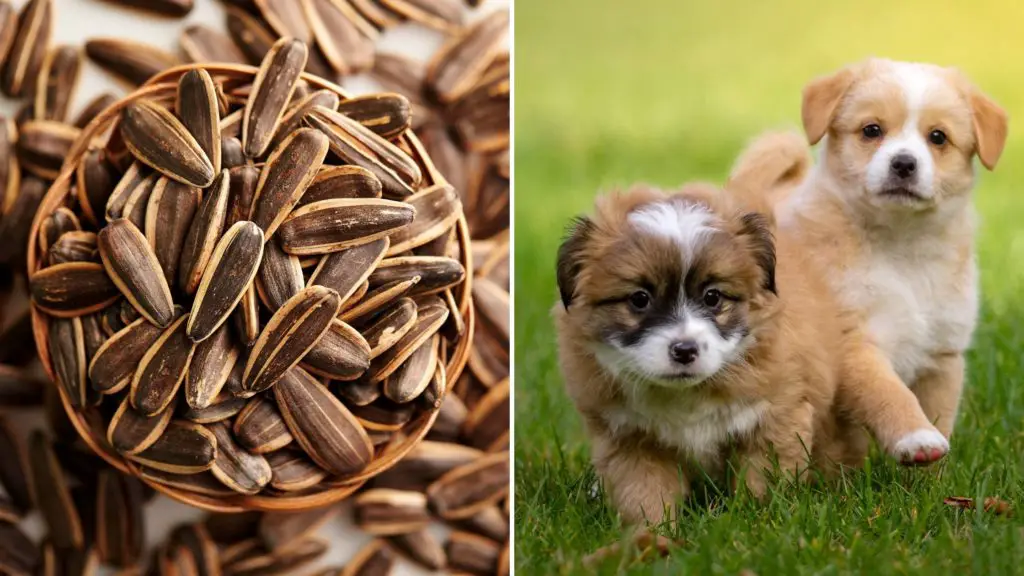
Yes, puppies can enjoy de-shelled sunflower seeds as a tasty snack or nutritional supplement if prepared properly. Smaller dogs are at higher risk of choking, which means it’s even more important to only feed puppies sunflower seeds without the shell on.
How to feed your dog sunflower seeds safely
The best way to feed your dog sunflower seeds is to choose the unsalted type and de-shell them before grinding them up. Simply sprinkle the powdered seeds onto your dog’s usual food as an occasional tasty supplement. Other seeds such as pumpkin, sesame, chia and flax seed also make nutritional boosters for your dog.
How many sunflower seeds should you feed your dog?
Sunflower seeds contain approximately six calories per gram. Ask your vet how many calories your dog should be consuming per day and total up his usual food intake with snacks such as sunflower seeks. Make sure the total doesn’t exceed the recommended daily allowance to keep your dog fit and healthy.
Is birdseed bad for dogs?
If you love birds too, chances are your garden will contain a bird feeder or two. Birds drop food every time they eat, leaving tasty-looking dog-sized snacks on the ground for your dog to pick up. But can birdseed harm canines?
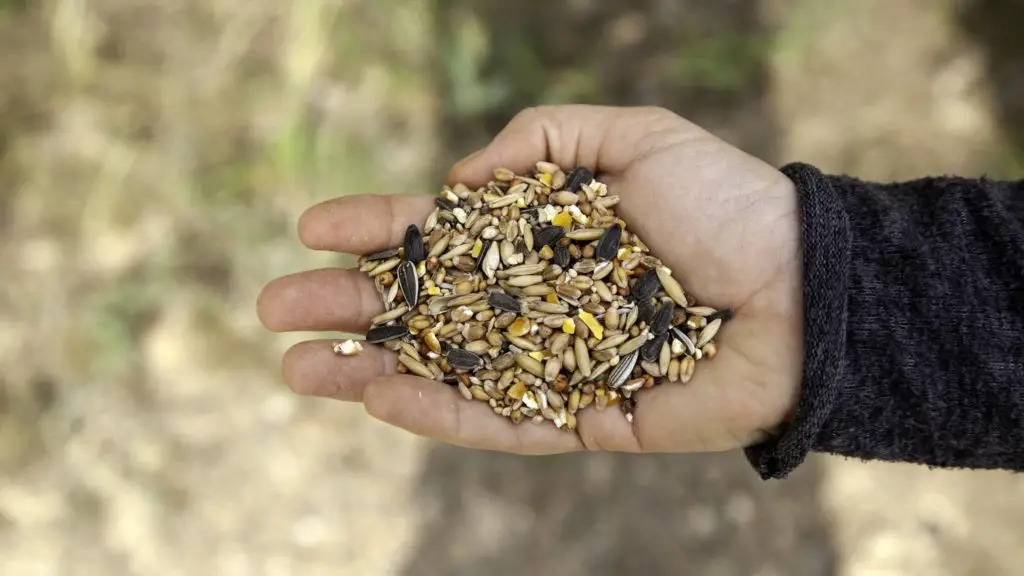
In most cases, if your dog hoovers up some birdseed it won’t harm them. However, a large amount of bird seed can cause health issues and there are a few things to be aware of before letting your pet dine with the birds.
Check the ingredients: most bird seed contains raisins or sultanas which are toxic to dogs and can cause kidney failure. Choose a bird seed that contains other ingredients that are safer for canines such as apricots just in case your pooch eats any.
Pick up moldy seeds: if you leave bird seed on the ground for too long it will grow mold which contains toxic chemicals that can lead to liver damage in animals.
Be mindful of bacteria: if your dog picks up dropped bird seed from underneath the bird table there’s a chance that the seed contains bird feces. Bird feces contain harmful bacteria and even parasites that could cause illnesses such as sickness and diarrhea if your dog eats them.
Large amounts of birdseed could cause blockages and bloating: if your dog consumes a large amount of bird seed there is a risk that they could have a gastrointestinal obstruction from the seed clogging up the intestinal tract. This can be extremely painful for dogs and can even end up requiring surgery to clear the blockage.
A simple way to try to stop your dog from eating birdseed is to keep it high up and use a tray underneath to catch any seed that falls off. Regularly collecting any dropped seed and cleaning the area are other ways to prevent your dog from eating any leftovers.
Are sunflowers poisonous to dogs?
If you’re wondering ‘are sunflowers toxic to dogs?’ you don’t need to worry if your pooch decides to start chomping on your garden sunflowers or when out for a walk. Sunflowers themselves are not harmful or poisonous to dogs. If your dog regularly enjoys a sunflower’s petals as a snack, too much vegetation could upset their stomach.
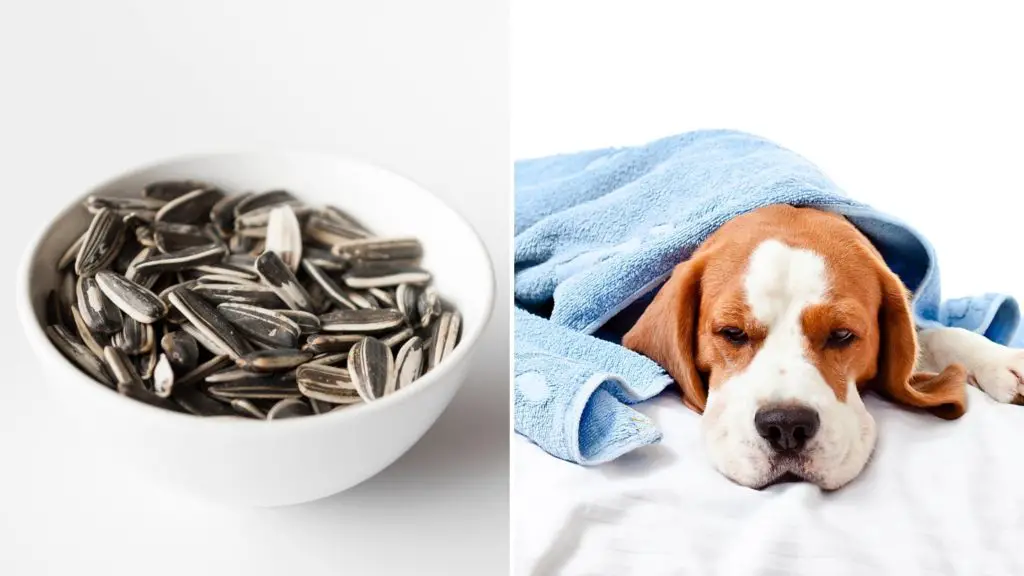
What happens if a dog eats sunflower seeds?
If your dog eats sunflower seeds with the shell on, they may experience chronic diarrhea and gastrointestinal distress.
What seeds and nuts are toxic for dogs?
Seeds
- Apple seeds, cherry pits, peach pits and plum pits: all contain the toxic cyanide. Symptoms of cyanide poisoning include heavy breathing, vomiting and skin irritation. Contact your veterinarian immediately if you think your dog has eaten anything that could contain cyanide.
Nuts
- Mouldy and black walnuts: are extremely toxic to dogs. The mould in old walnuts contains a neurotoxin that can cause tremors and seizures in dogs. Black walnuts can also lead to neurologic symptoms and vomiting.
- Macadamia nuts: can be very toxic to canines, causing depression, weakness, tremors and hyperthermia.
- Pistachios, raw cashews, hickory nuts: have all be known to cause neurologic symptoms in dogs as well.
If your dog shows signs of weakness, depression, tremors, hyperthermia, bloody or blackened stools or orange-colored urine you should seek urgent advice from your veterinarian.
In general, seeds with hard exteriors can be choking hazards for dogs because of their size and shape.
Dogs and sunflower seeds
As long as you choose unsalted and unflavoured sunflower seeds that are de-shelled, your pooch can be given them as a snack or crushed up to make a powder that can be used as a food topper in their usual dog food.
Remember to give them to your furry friend in moderation to prevent excess weight gain and associated health issues.
Next time you tuck into some delicious sunflower seeds as a snack, don’t forget to save and prepare a few for man’s best friend.
References:
- Nourish by WebMD, ‘Health Benefits of Sunflower Seeds’, https://www.webmd.com/diet/health-benefits-sunflower-seeds#1, Accessed – 6 May 2021
- VCA Hospitals, ‘Pancreatitis in Dogs’, https://vcahospitals.com/know-your-pet/pancreatitis-in-dogs, Accessed – 6 May 2021

